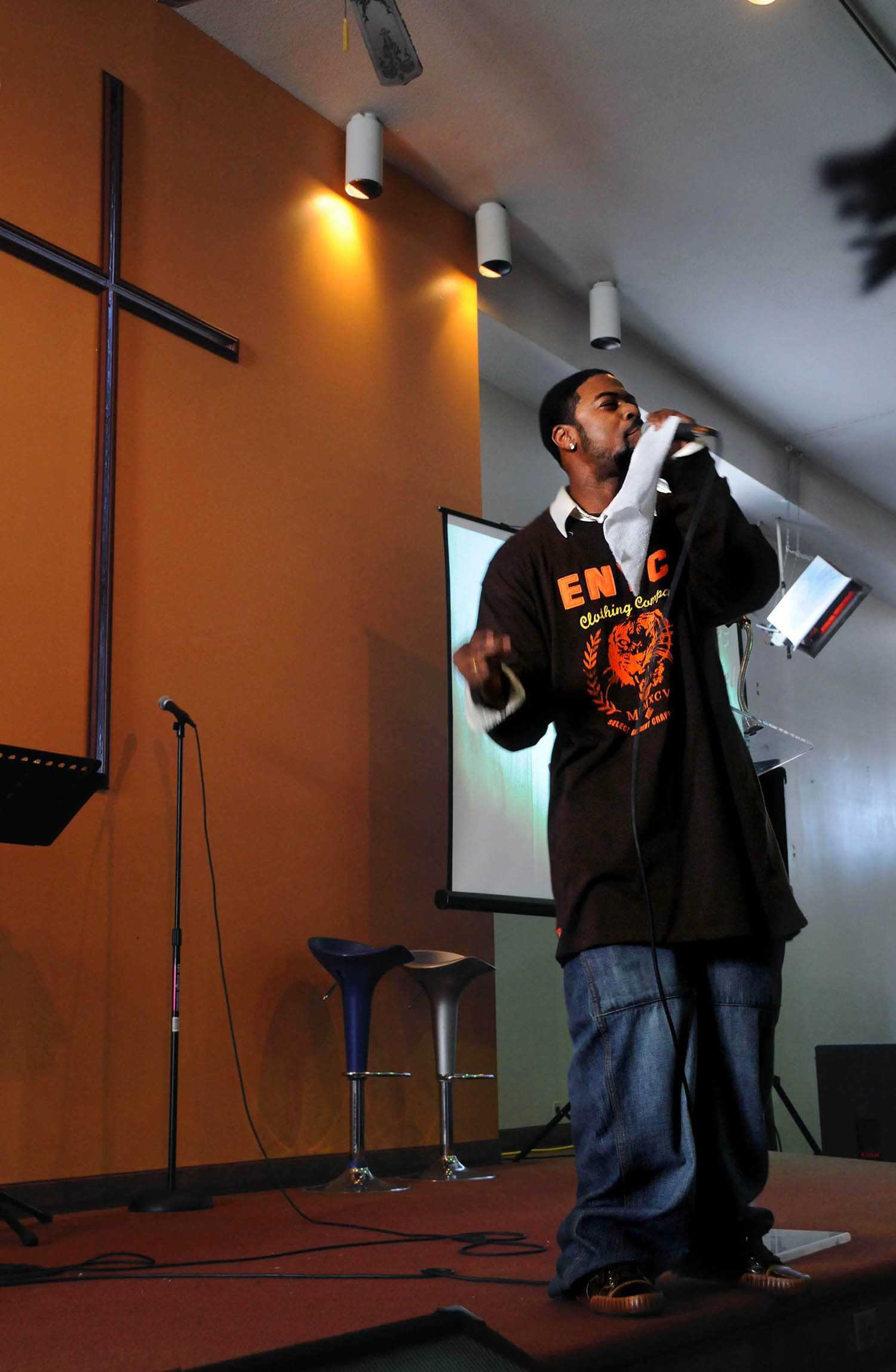
PHILADELPHIA (BP)–As teaching pastor of Epiphany Fellowship Church in inner-city Philadelphia, William “Duce” Branch also is a Christian rap artist. The group he co-founded, The Cross Movement, has received two Grammy nominations.
Today’s teaching pastor, however, was yesterday’s street kid. Having spent most of his teen years away from God, Branch abandoned the evils of Hip-hop culture but not the call to evangelize it.
“Hip-hop was the primary social influencer of my generation,” Branch told Baptist Press. “I wanted to have the faith of my father, but also the social connection of what was going on in that day.”
Regarding his conversion to Christ as a child, Branch credits his father, a single parent, who was “discipled by white, evangelical, conservative Christians. That gave me a solid theological framework. But it didn’t teach me how to intelligently wrestle through the issues of both faith and culture.
“You know, you’re handed Christian culture, or subculture. And basically that’s somebody else’s version of it,” Branch said. “You’re not taught to reconcile faith and culture, normally.”
The faith of his father did become more his own as Branch studied his way to a bachelor’s degree at Lancaster (Pa.) Bible College and a master’s degree at Dallas Theological Seminary. But some of his African American street roots never left, enabling Branch to successfully blend biblical lyrics with rap music, which appeals to those who’ve left the Hip-hop culture and those who remain in it.
“Some Christians don’t feel it’s a crime to be ignorant of Hip-hop, even though we’re in a world where it’s having major impact on the new generation. In some Christians’ worlds, they’re safe from Hip-hop. They don’t have to consider it, know it or engage it. But outside of that small world — it’s a very small world — the globe is talking about Hip-hop,” said Branch, citing the genre’s global following.
“Hip-hop has more theological implications than people realize, too,” said Branch, whose master’s thesis was titled “Theological Implications of Hip-hop Culture.” Branch –who is known in the Christian rap world as “The Ambassador” — used the content of his thesis as creative material for his latest CD, “The Thesis.”
Branch also heads up Cross Movement Records, an entity dedicated to discovering Christian rappers and launching their careers. But he is not without his detractors, one of whom has vilified Branch and other Christian rappers for retaining connections to the Hip-hop world. Branch responds in self-interrogatory style: “Would that be a great ministry tool if Jesus left me like I was, but changed my core, my framework, my worldview, my allegiances, but left my forms, my swagger? You know what I’m sayin’? Anything that’s not like Him, get rid of it. So, the pride of Hip-hop can’t co-exist. The self-focus can’t, OK; the vulgarity can’t, OK; the drugs can’t, OK. Like, you start taking the sins of Hip-hop away — is there anything left? Well, yeah. My hat maybe, the size of my T-shirts, maybe. Some of my mannerisms, my hand motions coming from the emcee.
“I want to hit the culture through two primary means,” Branch said: “The church pulpit and then the mic as a pulpit [through Christian rap music].”
“I’m not reaching for the stars. I’m not aiming for fame,” he added. But in ministry, “I’m looking to go farther than I’ve gone before if possible.”
Branch said his sense of call “was simply in who I am. It feels native to me, like something I could do. And I’m learning how Jesus Christ comes in and takes over.” He has devoted himself to urban ministry for nearly 15 years, the last two as a pastor at Epiphany.
Branch’s vision for Epiphany Fellowship, where he is co-pastor with Eric Mase — another Dallas Theological Seminary graduate who is pursuing a doctorate at Gordon-Conwell Theological Seminary — began years ago when he came back to Christ. “When I saw the Gospel reach a group and make that group feel like they could be accepted by God without changing their hat or changing their hair, I got excited about that mission.”
An advocate of the Apostle Paul’s evangelistic tactic of becoming all things to all people, Branch said: “You see me, and then you see [Tony Evans, pastor of Oak Cliff Bible Fellowship in Dallas], and you say, ‘You’re both in the pulpit. You’re both black. But you’re different. You look worlds apart.’ Now, the question is this: Is my world bad and his world good? You would have to say, ‘Nahh, because when I heard his view of justification from the Bible, it was the same one that you were sayin’. And yours was the same one the Apostle Paul was sayin’.’
“One of my delights is to take truths that were deposited in me, or that I learn on my journey, and make sure that I deliver them to a world that is plugged into the wrong mindset,” Branch said. “God preserved me from scandal, poured richly into me and gave me a passion to teach. I know God also had called me to the pastorate. I’m a hinge. I have connections to both worlds. And I don’t want them to stay apart.”
The Hip-hop world of Philly and the Gospel don’t remain separate. Starting with only nine people about two years ago, Epiphany now attracts nearly 300 every Sunday, half of whom came to Christ for the first time through the church’s ministries.
Citing a series of events and contacts, Branch said the North American Mission Board sponsored Epiphany as part of its Strategic Focus Cities evangelism and church-planting initiative in major U.S. cities.
“Every Sunday, we have a huge influx of visitors, which indicates people like the Epiphany experience enough to tell people about it. It’s steady. But this isn’t about numbers, it’s about momentum,” Branch said.
“We have parents who come and scout us for their own kids, and then the parents start attending, too,” Branch said, “and this in a day when people are attracted to more form than function, or cloak rather than core.
“Some say, ‘Oh, I know, you’re getting them with a great show.’ But we really don’t have one,” Branch added. Both he and Mase say the church is not a Hip-hop church but ministers to those who live or lived in that culture. Branch has performed Christian rap as a ministry at Epiphany only twice.
“Hip-hop is eclipsed by our commitment to the things that unify Christians, and that’s the way we like it, without betraying the fact that Hip-hop culture is one of our primary demographic targets,” Branch said. “We know that Hip-hop won’t be missed because many of us were redeemed out of that social context. A lot of that is still part of us and still shows up, but we subordinate it to winning some to Christ.”
–30–
Norm Miller is a freelance writer based in Richmond, Va. For an audio/pictorial account of William Branch’s personal testimony, click here.













